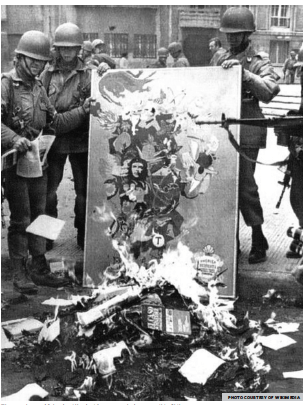
September 11 is a day etched in our memories in unforggetable way. As the second week of September rolls around, Canada and the rest of the world remembers once again the tragic attacks on the the United States in 2001. Though the attacks occurred south of the border, Canadians quickly provided aid, grieved for the victims and their families, and worried about what the events of that day meant for the future. Most of us at York, including myself, were kids when it happened and recall this day vividly. But for generations before us, September 11 was a day full of meaning long before 2001.
Forty years ago today, Salvador Allende, the democratically elected president of Chile, was overthrown in a bloody coup d’état by the Chilean army. The ensuing violence lead to the massacre, torture, mutilation, and rape of tens of thousands of left-wing civilians by the regime of General Augusto Pinochet. Much like Bin Laden, Pinochet had the backing and financial support of the United States, the United Kingdom, and various corporations.
Now to some, this event may be just another Cold War footnote that pops up occasionally in some history textbook, but to the thousands who fled Chile in the coup’s aftermath, it was life-changing. Many of those refugees actually settled in Canada, and the second or third generation of Chilean-Canadians have attended or are attending York.
Pinochet’s crimes didn’t simply end with the slaughter of innocents. He initiated some of the first neoliberal policies the world had ever seen. He strangled unions, privatized every industry except copper, opened up Chile’s natural resources to rabid exploitation while ignoring indigenous land claims, and privatized social security systems. He did this while opening Chile’s doors to Canadian, American, and British firms to come in and exploit the destroyed labour market while moving their profits out of the country.
The scars of the dictatorship run deep for Chileans both here and back home. Since the implementation of this dual dose of genocide and free market policies, Chile boasts one of the widest gaps between the rich and the rest. Despite on-paper GDP growth rates, the disproportionate wealth distribution in society has engendered mass movements lead by students.
For the past couple years, the free tuition movement in Chile has lead to a couple of occupations of their congresses, as well a multiple 48-hour general strikes. The shocking thing is that this is all being led by students, some just high school-aged. Instead of making out under their stairwells during lunch breaks, as one would expect, these kids are drawing up manifestos for the nationalization of universities and key sectors of the economy.
Looking back at what happened in Chile 40 years ago on September 11 shouldn’t be just an act of remembering those who lost their lives or whose lives were destroyed by a brutal regime; rather, it should be an active remembrance to enhance our understanding of the kind of world we see ourselves in today.
Alexander Moldovan
Contributor


